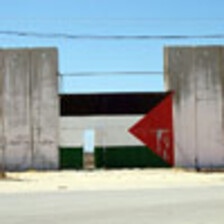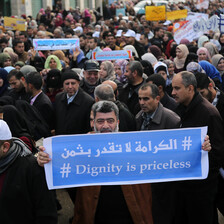The Electronic Intifada 21 April 2006

Because of a forced delay of more than 140,000 government employees’ salaries in both the West Bank and the Gaza Strip, the customers have been unable to pay their supermarket tabs.
In the Gaza Strip refugee camp of Nuseirat, which shelters a population of about 80,000 men, women and children, both grocers and customers began to complain out of an increasing financial crisis due to such a delay.
At ‘Happy Land Center’, one of the two largest supermarkets in Nusairat, which is owned by Mr. Abu Amer Abu Yousef, 47 years old, the conditions speak for themselves; “Prior to the ongoing delay of employees’ salaries, business was relatively good, but now it has become much worse,” Abu Amer said.
“The majority of customers have tightened their belts, purchasing only necessities like sugar, tea, oil and beans, and foregoing other less important things like cookies.”
“Since my customers have been buying so little over the past two weeks, I have been hesitant to bring in new shipments of products. I have been allowing my customers some leeway, and not forcing them to pay, because I know they don’t have money right now. But now, with the sellers demanding payment, I don’t know what to do. I am ashamed to tell them I can’t pay them, because I have been selling products on credit at my store, and haven’t been paid by my customers.” Abu Amer added that he had already had to dismiss three of his six employees because he couldn’t afford to keep them on.
“Some people have asked me for cash loans, because they have no money to meet their basic needs, mainly transportation, and I feel obliged to lend them the cash, for they are my customers, who were always very reliable about paying me and helping me maintain my business. But that was when they were able to receive their salaries.”
In one hour, during the evening hours, usually a big rush time for shopping, only two customers came in the supermarket; one bought a box of cigarettes, while the other bought a can of Pepsi and sat down to talk, as he was a friend of Abu Amer.
Asked about his reaction to the current situation, a third customer, who works for the Nusairat Municipality, said he would stop going to work, as he can not afford to remain without money. He is indebted to Abu Amer 300 New Israeli Shekels (NIS), about $70.
At the largest Nusairat-based supermarket (Abu Dalal Brothers’ Supermarket), owned by Hatem Abu Dalal, 35 years old, the number of customers was more than the Happy Land Center’s, however, sitting beside Hatem gives a person the true picture: out of ten customers who entered in the hour, only three paid cash.
“Debts have increased and we have increasingly become unable to pay the sellers; our sales have decreased to half what they were before this crisis – a matter that has embarrassed us in front of both customers and merchants alike.”
The goods featured in the front window of the shop – imported European chocolate and other luxury items, have not sold at all during this time.
“I have 9 employees”, said Hatem, “Only 3 of them are now actually working, while the others are not working, as I’m not able to pay them. If conditions continue like this, I’ll have to close my shop and go bankrupt within two months time.”
While Hatem was speaking, his worker Ahmad Awad, 22, was playing with his cellular phone at one of the supermarket’s corners, just wasting his time.
Hatem confirmed that he used to give his workers an average monthly salary of NIS1000 (about $200), however, he is now considering decreasing his staff to half.
Hussam Nafez, a 30 year-old local policeman, came in the the supermarket to buy some goods on credit. He said, “my expenditures have been reduced to a bare minimum: no family visits, no extraneous goods, only basic needs — with no salary in the horizon, what choice do I have?”
“Those who are responsible for our salary delay are the Americans, the Europeans and the Arabs. Isn’t it [referring to January’s election of Hamas] the democracy they wanted from us, why do they then punish the whole people for their choice?” With this question, both Hatem Abudalal and his customer Hussam concluded their discussion.
The major international donors of aid to the Palestinian people, such as the United States and the European Union, have cut off aid to the Palestinians recently, demanding the newly-elected Palestinian Hamas-led government to recognize Israel’s right to exist and renounce violence against Israel.
Karen Koning AbuZayd, commissioner-general of the United Nations Relief and Works Agency for Palestine Refugees, known as UNRWA, was quoted as saying “donor countries who decided to cut aid to the Hamas-led government should be aware of the consequences of their decision on the humanitarian conditions in Gaza and the West Bank, where a total of 3.8 million Palestinians live.”
Rami Almeghari is currently a Senior Translator at the Translation Department of the Gaza-based State Information Service (SIS) and former Editor in Chief of the SIS-linked International Press Center’s English site.
Related Links





